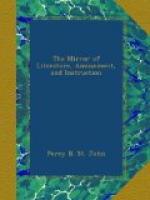Among the active vices of the Mexican Indian, that of drunkenness prevails to a most lamentable extent. In the upper districts, pulque, or the fermented juice of the aloe, is the principal tempter; sometimes a spirit, distilled from the same plant, called Vino de Mescal; while, in the hotter districts, the same effects are ensured by the chinguirito, a very coarse kind of rum. Combined with this disposition to intoxication, the Indian is constitutionally indolent; and, now that he is a free man, he will rarely work, except to obtain just as much as will afford him the means of enjoying his greatest luxury—that of steeping his senses in oblivion. This last tendency is much to be deplored, as, in the larger towns, we know that every Sunday (which is the day of greatest indulgence) assassinations, to the extent of six or eight each day, are the melancholy consequence of its indulgence. Humboldt states that the police were in the practice of sending tumbrels round, to collect the unhappy victims of intoxication. The punishment was, and we believe still is, three days’ labour in the streets; but it does not seem to be very efficacious, for generally within the week the delinquents are again in custody.
There is something characteristic in the indolence of these sombre beings. They will travel immense distances; but to steady labour they are, generally speaking, not prone. It is told of them, that in one of the most fertile districts (the Baxio) it is not unusual for an Indian, on receiving his wages, to get thoroughly drunk, go to sleep, and on awakening renew his potations and repose, until the exhaustion of his finances compels him to return to labour. In some parts, however, there are exceptions to this observation.
Education has been more attended to, by some of the leading personages, than could have been expected in a society that had been so much kept in the shade. We apprehend the advantages are chiefly prospective, and may be well defined in another generation; at present they are but small. The whites have been, and still are, the most educated portion of the Mexicans, owing, no doubt, to their greater opulence, and having access to official rank. The mass of ignorance, however, among all classes, is inconceivable to any one who has only moved in the principal countries of Europe. Nor is it confined to the lower classes, but finds protection among the highest in the community. We heard a reverend canon of the metropolitan church gravely inquire, whether it was possible to reach London except by sailing up the Thames. And we knew a very pretty, agreeable young lady, moving in the first circles, who could not write a single letter at the age of seventeen. She has been since married, and has, we are informed, been taught to write by her husband, who is not a Mexican. The religion of all classes resembles too much that of the Indians; and the practical morality and general tone of society




